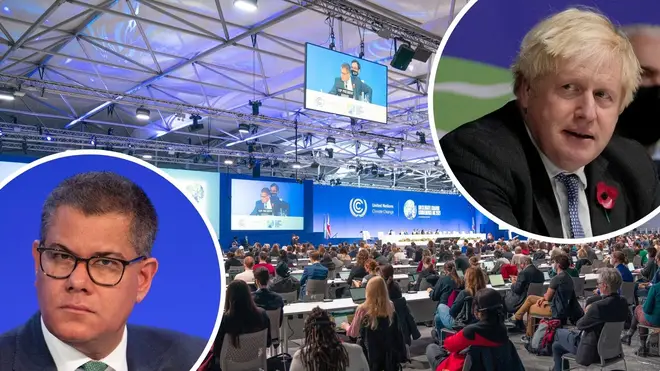
Oli Dugmore 4am - 7am
13 November 2021, 10:43 | Updated: 13 November 2021, 10:47

An "ambitious outcome is in sight" as COP26 negotiations enter overtime, Prime Minister Boris Johnson has said.
His comments came during a call with Canadian Prime Minister Justin Trudeau on Friday, despite the event surpassing the scheduled finish of 6pm.
COP26 president Alok Sharma said agreements were set to be struck overnight, with revised documents available on Saturday morning.
Requests for countries to phase out "unabated coal" and "inefficient fossil fuel subsidies" have remained in a new draft version of the Cop26 deal.
The latest copy, published over 13 hours after the talks were due to end, also asks countries to "revisit and strengthen" their 2030 emissions-cutting targets by the end of 2022, which is seen as key to keeping global warming limited to 1.5C.
It requests countries revisit the targets "as necessary to align with the Paris Agreement temperature goal by the end of 2022, taking into account different national circumstances".
However, Mr Sharma added that talks were likely to continue into Saturday afternoon, with countries due to return to another meeting later in the day.
A Downing Street spokeswoman said: "[Mr Johnson and Mr Trudeau] discussed progress in the ongoing COP26 negotiations in Glasgow and agreed that an ambitious outcome is in sight."
She added: "The leaders committed to work together to help resolve outstanding issues in the talks and reach an agreement at COP26 that works for all countries."
Read more: Cop26 analysis: Talks enter the end game - will ministers become the Avengers?
Read more: Draft COP26 plans water down targets to curb fossil fuels

Jack Foster reports from COP26 as negotiations move into extra time
At an afternoon plenary on Friday, countries set out their views on the latest drafts of the agreements, which had been published earlier in the day.
Two major issues of concern were financial support for poorer countries in efforts to adapt to climate change and the phasing out of "unabated coal and subsidies for inefficient fossil fuels".
The draft appeared to have weakened its push to curb fossil fuels, instead focusing on "rapidly scaling up clean power".
There were also warnings that limiting temperature rises to 1.5C - a deal set in place as part of the Paris Agreement - was a "matter of life and death".
Scientists have said that global emissions need to be reduced by 45 per cent by 2030, reaching net zero by 2050.
Read more: 'I am part of her movement': PM's COP26 adviser Mark Carney hails Greta Thunberg

Ed Miliband calls in from COP26 to comment on the climate crisis
However, pledges from world leaders leave the world well off track to meet the goal.
It has left negotiators under added pressure to resolve issues and rapidly increase their ambition for emission cuts in the 2020s.
There have also been efforts to find an agreement on delivering workable carbon markets and on transparency so it is clear the action countries are taking on emissions.